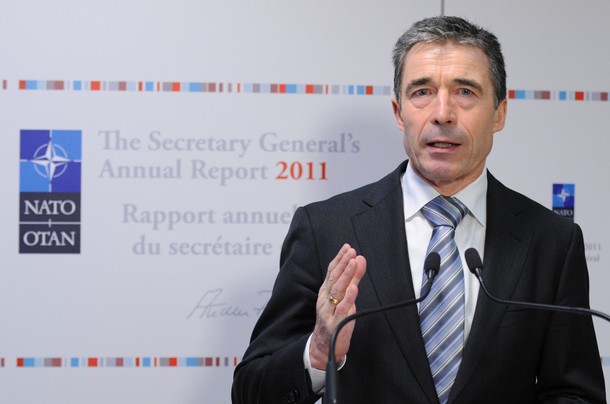
From Anders Fogh Rasmussen, NATO: I hope we will be in a position to adopt a political declaration on smart defence as a framework, as a political framework, for, I would call it a new way of doing business, in the coming years. It’s a concept focused on more multinational cooperation. We simply can’t continue to do business as usual.
And I would like to stress this is not just about a period of economic austerity. It’s a long-term challenge, because we have seen rapidly increasing prices of high-tech military equipment.
So in the future we will see that individual Allies can’t afford to acquire expensive military equipment, but by pooling and sharing resources they will be able to acquire such equipment.
So it’s a new concept of doing defence business, so to speak.
So I hope a political declaration can create the political framework. In that political declaration I also hope to see a political commitment to a number of concrete projects. It’s a bit premature today to announce such specific projects, but as an indication I can tell you that I see missile defence as an excellent example of smart defence, because missile defence is an example of a multinational project where a number of Allies provide input, notably, of course, the United States, but also a number of European Allies will provide input. A number of them have already announced that they will host missile defence facilities. So missile defence is actually a prime example of smart defence.
Furthermore, I could mention air policing as an example of smart defence. At a certain stage we will have to make a decision on more long-term arrangement of air policing in the Baltic states, and air policing is, again, an excellent example of smart defence, because a number of Allies do air policing on behalf of the Baltic states, and in exchange the Baltic states can focus their defence investments on, for example, deployable armed forces that can participate in international operations, instead of investing heavily in an air force to do air policing.
Again, we see an example of role specialization, which is an integrated element in smart defence.
So I think smart defence will be a combination of a number of concrete multinational projects, and a long-term political vision of how to do defence business in the future.
Excerpt from remarks by NATO Secretary General Anders Fogh Rasmussen at press conference, January 26, 2012. (photo: Getty)
Image: getty%201%2029%2012%20Rasmussen%20press%20conference.jpg
